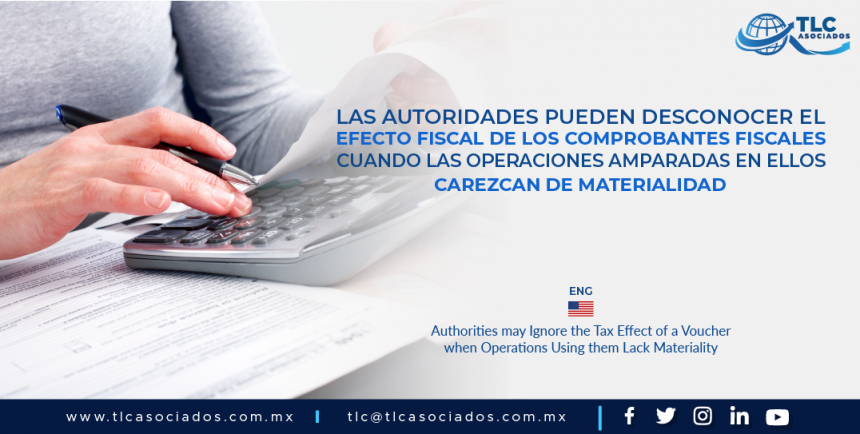
DCA3 – Las autoridades pueden desconocer el efecto fiscal de los comprobantes fiscales cuando las operaciones amparadas en ellos carezcan de materialidad/ Tax authority can ignore the tax effect of tax voucher when operations using them lack materiality
En sesión del día veintiocho de agosto de dos mil diecinueve, el Pleno Jurisdiccional de la Sala Superior del Tribunal Federal de Justicia Administrativa acordó la jurisprudencia número VIII-J-SS-118, la cual al rubro dispone lo siguiente: COMPROBANTES FISCALES. LA AUTORIDAD PUEDE VÁLIDAMENTE DESCONOCER SU EFECTO FISCAL CUANDO LAS OPERACIONES AMPARADAS EN ELLOS CAREZCAN DE MATERIALIDAD.
Para la emisión dicho criterio jurisprudencial, el Pleno Jurisdiccional de la Sala Superior del Tribunal Federal de Justicia Administrativa consideró la tesis número 1. CLXXX/2013, donde la Primera Sala de la Suprema Corte de Justicia de la Nación definió que los comprobantes fiscales son medios de convicción. Con el uso de estos, los contribuyentes acreditan el tipo de actos o las actividades que realizan para efectos fiscales; es decir, su función es dejar constancia documental fehaciente de que existió un hecho o acto gravado por una contribución y determinar cuál es la situación fiscal en concreto de un contribuyente.
En ese sentido, el Pleno Jurisdiccional enfatizó que no debe perderse de vista que las autoridades fiscales a través de sus facultades de comprobación pueden verificar si la factura emitida por un contribuyente efectivamente consigna un hecho gravado por una contribución. Por otra parte, que el comprobante fiscal no sea cuestionado respecto a los requisitos previstos en los artículos 29 y 29-A del Código Fiscal de la Federación no implica que proceda de forma automática. Por ejemplo, ya que la autoridad puede advertir por diversos medios que la operación a que se refiere la factura es inexistente, el acreditamiento o la devolución solicitada con base en puede desconocer el efecto fiscal que el contribuyente pretende con dicho documento, ya sea acumulación de ingreso o deducción, pues no existe el hecho gravado por la contribución.
Ahora bien, una vez cuestionada la operación que ampara el comprobante, no todo está perdido para el contribuyente. El Pleno Jurisdiccional señaló que atendiendo a la carga probatoria que le compete en el juicio contencioso administrativo, le corresponde al demandante aportar otros medios de prueba para demostrar su materialidad, es decir, el contribuyente puede demostrar en juicio por diversos medios que en la especie sí se llevo a cabo la operación que ampara el comprobante fiscal.
“En TLC Asociados desarrollamos un equipo multidisciplinario de expertos en auditorías y análisis de riesgos para asesorar, implementar estrategias y dar cumplimiento en operaciones de comercio exterior”.
Para más información o comentarios sobre esta publicación contacte a:
División de Conciliación y Defensa Aduanera
TLC Asociados, S.C.
Prohibida la reproducción parcial o total. Todos los derechos reservados de TLC Asociados, S.C. El contenido del presente artículo no constituye una consulta particular y por lo tanto TLC Asociados, S.C., su equipo y su autor, no asumen responsabilidad alguna de la interpretación o aplicación que el lector o destinatario le pueda dar.
On a session on August 28th of 2019, the Jurisdictional Board of the Upper Chamber of the Federal Court of Administrative Justice agreed on jurisprudence number VIII-J-SS-118, providing the following: TAX VOUCHER. THE AUTHORITY CAN IGNORE THEIR FISCAL EFFECT WHEN THE OPERATIONS COVERED BY THEM LACK MATERIALITY.
In order to submit the previous jurisprudential criterion, the Jurisdictional Board of the Upper Chamber of the Federal Court of Administrative Justice considered thesis number 1.CLXXX-2013. Here, the First Chamber of the National Supreme Court of Justice states that tax vouchers are considered evidence. Using these, taxpayers accredit the activities carried out for tax purposes, i.e., their role is to establish documentary evidence of the existence of a fact or act taxed by a contribution and to determine the specific tax situation of a taxpayer.
In this sense, the Jurisdictional Board pointed out that we must not forget that tax authorities, using their verification authority, can check if the invoice issued by the taxpayer registers an event taxed by a contribution. Moreover, the fact that the tax voucher is not questioned with respect to the requirements laid down in articles 29 and 29-A of the Federal Fiscal Code does not mean that it proceeds automatically. For example, given that the authority is able to warn by various means that the operation to which the invoice refers is non-existent, the credit or refund requested based on this has the possibility of ignoring the tax result the taxpayer intends to achieve with this document, either accumulating income or deducting, since there is no fact taxed by the contribution.
Not everything is lost if the operation that protects the voucher is questioned. The Jurisdictional Board indicated that indicated that in light of the burden of proof that is in hands in the contentious-administrative trial, it is for the applicant to provide other evidence to prove his materiality. In other words, the taxpayer can prove in court by various means that the operation covered by the tax voucher was carried out.
“In TLC Asociados, we develop a multidisciplinary team of experts in audits and risk analysis for consulting, implementing strategies and complying with foreign trade operations”.
For further information or comments regarding this article, please contact:
Customs Defense and Conciliation Division
TLC Asociados, S.C.
A total or partial reproduction is completely prohibited. All rights are reserved to TLC Asociados, S.C. The content of this article is not a consultation; therefore, TLC Asociados S.C., its team and its author do not assume any responsibility for the interpretations or implementations the reader may have.
.
Search
Nuestros servicios
- División de Auditoria Preventiva y de Cumplimiento
- División de Certificaciones OEA-NEEC-CTPAT
- División de Certificación en Materia de IVA/IEPS y Recinto Fiscalizado Estratégico
- División de Blindaje Legal
- División de Consultoría
- División de Lobbying
- Gestoría de Permisos Especiales
- Arquitectura Aduanera
- Revista TLC
- Libros TLC
